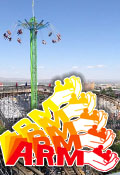The Park Playground, offering location-based VR Entertainment, is looking at opening locations in the U.S. in 2022
By News Release | November 4, 2021
The Park was launched in June 2018 and the market data deemed it a success. They believe there are three reasons for that.
Philippe Deschutter (CEO):
First, The Park doesn’t emphasize technology; we focus on experience. It’s inherent in our design. Other VR franchises use cold colors and surfaces, going for the sci-fi look. We build large open venues with soft colors and natural light, abundant wood and plants, and a low-tech presence. This opens us up to a larger demographic audience interested in location-based social entertainment, not just virtual reality.
We further that approach with story-driven games based on the longest-running, most popular shows on television. Fans are no longer satisfied with movies coming out every three years. They want more opportunities to connect with their favorite characters and storylines. Being owned by Telenet, the largest media company in Belgium, and part of Liberty Global, we can activate and engage audiences by immersing them in the stories they are passionate about.
Our audience shows that this approach worked. Our customers are 43% female, +40% company team building (post covid) and over 31-years old on average. The Park isn’t just for kids and gamers, though we attract them as well.
Analysts project the LBVR market to grow to 33% CAGR to 1.5 billion by 2026 as part of the bigger LBE market which is expected to grow to a market cap of 25 Billion and a CAGR of 35%. The location-based VR sector to date has been dominated by VR and tech enthusiasts without the business experience and sophistication to build a sustainable and scalable business model.
I have a background in data-driven business models as the country manager for Uber Eats in Belgium. Our team developed the most sophisticated business systems in the LBVR market. We track every customer and employee interaction using NetPromoter so we can consistently monitor customer experience, labor rates and more. We employ sophisticated digital market funnels for customer acquisition so we can optimize marketing costs.
We grew to +200.000 visitors while maintaining an average user score of 9.1/10. Our lean data-driven approach enabled a much faster ramp up to profitability. We now can increase our investments into IP that appeals to a global marketplace.
Expansion plans outside of Europe:
Thomas Roozen (Head of Business Development):
With Liberty Global as our main investor, The Park was envisioned as a global brand. Since the success of its first venue, we started to build a structure that would scale internationally and gained the trust of brands like Vodafone and Kinepolis.
While we focus on growing to 30 owned venues in Western Europe very soon, we believe the combination of
a) focusing on experiences over technology,
b) compelling story-driven games that fans love,
c) a data driven approach to the business, will let us expand rapidly via franchising across EMEA and into the US.
We’ve already been granted our Franchise Disclosure Document and expect our first locations to open there in 2022.”
In the US we want to expand our location network together with a master franchise partner in which we are having initial discussions already.
We will be present at IAAPA in Orlando between 15-19 November to meet with future partners with whom we can achieve a rapid rollout of turn-key franchise locations.
On our franchise page interested partners can find more information about our turn-key franchise concept. Here they can also schedule a meeting with us while we are in Orlando.
Our content strategy:
Philippe Deschutter (CEO):
We see that 6 out of 10 customers come to The Park via word of mouth. So, we focus on getting strong initial traction via digital marketing strategies on one hand, and strong customer experience on the other. Instead of focusing on repeat play, we focus on delivering an
Some early LBVR companies relied heavily on the novelty of big IPs like Marvel and Star Wars to drive traffic. This strategy has its merits, but the pitfall is that you pay a very high upfront cost that might not return profits when your scale is limited, which is the case for early movers.
We design game mechanics with solid core loops based on actual customer feedback. We employ content score tables ranging from asymmetric information, enemy proximity, lateral movement, etc. Then we wrap compelling IP-based stories around the game. And since our IP isn’t tied to tent-pole movies that come and go in weeks, our customers are reminded weekly that they can immerse themselves in those stories at The Park.
The only way this business works for anyone is if our location footprint scales fast so we can amortize the development cost of the IP-based experiences over lots of locations. We are well-positioned to accomplish this because we have a solid, proven, sustainable operating model at the location level. Content will be the end game, but without solid unit-level economics, you cannot get to the scale to make it happen. We are having very exciting ongoing IP discussions now to produce our best VR experiences ever.
Own Content creation:
We are an investor in an award-winning VR development studio that is crucial to the quality of our future experiences. But we are always open to working with high-quality developers. When the scale of locations, and ticket sales, increases, The Park will start to look like a platform for developers and content creators. Much like movie theaters became a distribution platform for filmmakers, and arcades became venues for game developers. Our process of VR development is unique to the extent it’s heavily steered by the customer feedback on past experiences. During the first six months of a new game deployment, we work with the developer to optimize the experience based on our data. The entanglement with our developer partner allows for beautifully designed game dynamics but tailored to our audiences.

















